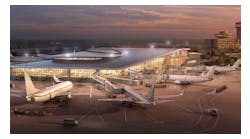Oct. 22—TRAVERSE CITY — In 2004, a new terminal opened at Cherry Capital Airport, runways were reconfigured, and any usable equipment was refurbished and relocated before the old terminal was demolished.
The relocated equipment included two passenger boarding bridges — mobile elevated walkways allowing travelers to walk from the terminal onto an aircraft — already more than two decades old, said Airport Director Kevin Klein.
The boarding bridges served gates No. 1 and No. 3 until last year, when a grant through the federal Infrastructure and Jobs Act reimbursed the airport for the cost to replace them, plus the 20-year-old bridge at gate No. 4.
The Airport Terminal Program paid $5,225,000 of the $5,741,264 project, Klein said.
Cherry Capital also received an Airport Improvement Grant — another program through the Infrastructure and Jobs Act — to fund expansion of the airport's terminal ramp to allow overnight parking for commercial aircraft.
The AIG paid just more than $4.56 million toward the $5,076,348 cost of the project, Klein said, which expanded the ramp to both the east and west.
The rest of the funding came from the state and from the airport's own budget, Klein said.
"The minute we opened the new ramp, within 10 seconds we had them being used, it was so needed," Klein said of the project started in April and completed in July.
The ramp extensions give airport staff room to direct pilots to park aircraft overnight and during weather delays or seasonally heavy traffic.
"The airport has six gates and there are time times when we have the capacity need for up to 14," Klein said.
"An aircraft comes in, parks at the gate, offloads the passengers and then for overnight they push that airplane back into these new ramps so the gate can be free for other flights to come in and out," Klein said.
The mechanics of how Infrastructure and Jobs Act money gets from federal coffers to local contractors is a process known as channeling and involves a state department acting as an agent on behalf of a municipal, regional or state agency or authority, federal records show.
For that money allocated to Cherry Capital Airport, for example, the Michigan Department of Transportation functioned as the agent, records show.
The federal government writes a check on behalf of the airport, the check is submitted to the State of Michigan and the State of Michigan channels the funds to the local airport — but only after the airport has followed Federal Aviation Administration processes and been approved for the money.
The airport, in this case, paid for the work upfront and was reimbursed with federal funding, Klein said.
"There's documentation and information we have to submit anytime we go to seek those reimbursement of funds," Klein said. "We will have a contractor come in, bill it, get a pay app for what they bill, we'll submit that to the State of Michigan, the airport will pay the contractor and the State of Michigan will reimburse the airport."
M & M Excavating of Gaylord was the contractor for the ramp extension, a company Klein said Cherry Capital has worked with previously on a taxiway and a ramp project.
Klein said he expects passengers to notice reduced congestion outside their windows after their planes land.
"Instead of waiting out on the airfield, they're waiting here at the ramp, and instead of waiting in the open, they're waiting here closer to the terminal so, when gates become available, they can quickly get in and out," Klein said.
___
(c)2023 The Record-Eagle (Traverse City, Mich.)
Visit The Record-Eagle (Traverse City, Mich.) at record-eagle.com
Distributed by Tribune Content Agency, LLC.


